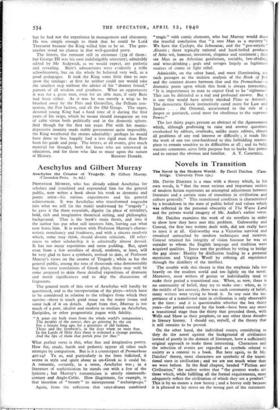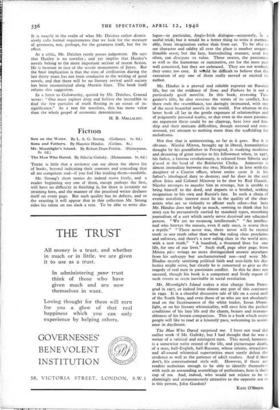Novels in Transition
The Novel in the Modern World. By David Daiches. (Cam- bridge. University Press 15s.)
MR. DAVID DAICHES is a man- with a theory which, in his own words, is "that the most serious and important section of modem fiction represents an attempted adjustment between literature and a certain state of transition in civilisation and culture generally." This transitional condition is characterised by a breakdown in the state of public belief and values which was reflected in the personal obscurity of The Waste Land and the private world imagery of Mr. Auden's earlier verse.
Mr. Daiches examines the work of six novelists in order to show how they have met this problem. Galsworthy and Conrad, the first two writers dealt with, did not really have to meet it at all. Galsworthy was a Victorian survival and remained untouched by modem techniques and motives. Conrad retained his integrity of vision because he was an outsider to Whom the English language and tradition were acquired qualities. Joyce met the problem by trying to bridge the gap alone: Huxley by disillusion leading to a personal mysticism and Virginia Woolf by refining all experience through the distillery of the intellect.
The trouble with this theory is that the emphasis falls too heavily on the modem world and ton lightly on the novel. Moreover, most writers of genius or individuality tend to make their period a transitional one. When, as now, there is no community of belief, they try to make_ one : when, as in the middle of last century, there was such community of belief, many writers were trying to break it. In any case the im- portance of a transitional state in civilisation is only observable at the time: and it is questionable whether the last thirty years—the period covered by the book—have been any more a transitional stage than the thirty that preceded them, with Wells and Shaw as their prophets, or any other three decades in literary history. I should say, mYtelf, of the theory that it still remains to be proved.
On the other hand, the individual essays, considering as they do the novel against the background of civilisation instead of purely in the domain of literature, have a sufficiently original approach to make them interesting. Characters and the selection of events are regarded as symbols related to society as a context to a book. But here again, to fit Mr. Daichee theory, most characters are symbolic of the transi- tional state in civifisation ; and We are not much wiser than we were before. In the final chapter, headed "Fiction and Civilisation,' the author writes that "the greatest works are those'which, while fulfilling all the formal requirements, most adequately reflect the civilisation of which they are a product." This is by no means a new heresy ; and a heresy only because it is phrased to lay stress on the wrong part of the statement.
It is exactly in the realm of what Mr. Daiches rather dismis- sively calls formal requirements that we look for the measure of greatness, not, perhaps, for the greatness itself, but for its effect.
As a critic, Mr. Daiches rarely passes judgement. He says that Huxley is no novelist ; and yet implies that Huxley's novels belong to the more important section of recent fiction. He is hesitant in face of the wordy monuments of Joyce. But the final implication is that the state of civilisation during the last thirty years has not been conducive to the writing of good novels, and that there will be no literary revival until society has been reconstituted along Marxist lines. The book itself refutes this suggestion.
In a letter to Galsworthy, quoted by Mr. Daiches, Conrad wrote: "One must explore deep and believe the incredible to find the few particles of truth floating in an ocean of in- significance." As a text for novelists, this has more value than the whole gospel of economic determinism.
H. B. MALLALIEU.



































 Previous page
Previous page